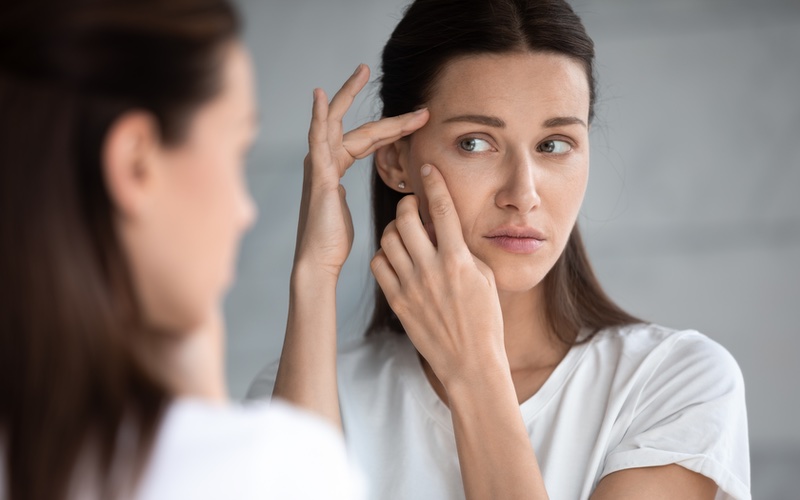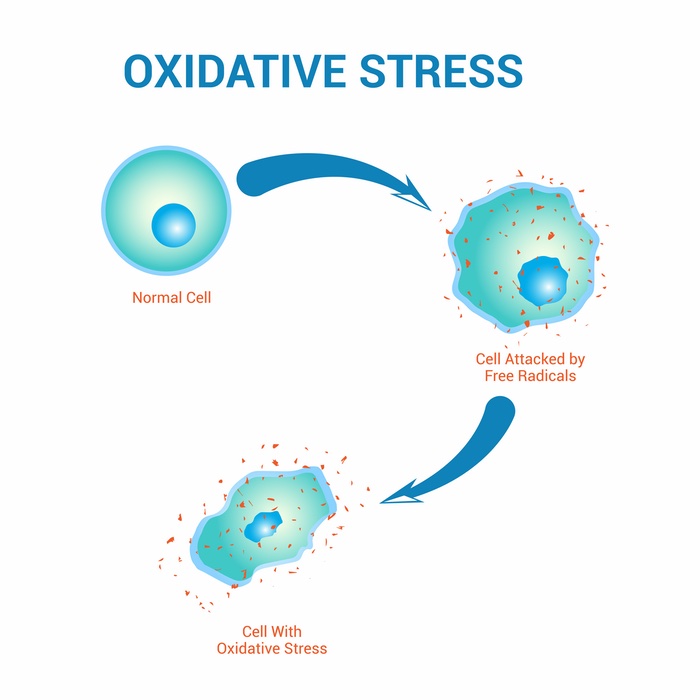
Everything You Need to Know About Oxidative Stress

The cells in your body complete many tasks to keep your body functioning. One of those tasks is combining oxygen with glucose (sugar) to help give you energy. Scientists call that process oxidation. During oxidation, your cells, tissues and organs break down molecules into atoms. As atoms form new bonds and change their function, they lose electrons.
Electrons are stable when they are in pairs. If an electron isn’t paired, it is unstable and considered a free radical. Free radicals seek out each other or even steal electrons from other atoms. This process causes damage to cells and DNA, diminishes the collagen in your body, and more. External sources like cigarette smoke, X-rays, chemicals and pollution can also create free radicals in your body. The existence of free radicals in your body is referred to as oxidative stress.
The Harmful Impacts of Oxidative Stress
Oxidative stress breaks down collagen in the body, which leads to aging. Unfortunately, that’s the least of it. Oxidative stress, or too many free radicals in the body, can cause chronic fatigue, inflammation, high blood pressure, and more. It can even lead to cancer, Alzheimer’s and Parkinson’s, diabetes, and asthma. So, what can you do about it?
Reduce Oxidative Stress - Naturally
There are many ways you can help combat oxidative stress in your body. Diet is one of them. Foods high in antioxidants help limit the impact of free radicals. Try to incorporate foods in your diet such as:
- Blueberries
- Strawberries
- Acai
- Broccoli
- Spinach
- Kale
- Dark Chocolate
- Pecans
- Potatoes
- Other Foods High in Vitamin A, C, and E

In addition to eating well, limit the amount of processed food you eat and your alcohol intake. Alcohol and processed foods, especially those high in sugar and fat, may increase oxidative stress.
Other tips for reducing oxidative stress in your body include:
- Increase physical activity
- Reduce stress in your life
- Avoid cigarette smoke
- Limit scented products in your home, such as candles, air fresheners, and citrus-scented cleaning products
- Use hard-smelling materials like glue or paint outdoors when possible
Incorporating just a few of these tips into your life can greatly benefit your body and overall health by helping to minimize oxidative stress.
Red Light Therapy Can Help
While the above tips can help you reduce the impact of oxidative stress on your body, it is impossible to eliminate all exposure to free-radical-creating sources like pollution, chemicals, pesticides, and more. Modern life is essentially reliant on machines, automobiles, cleaning supplies and other products that are harmful to our bodies.
Thankfully, red light therapy can help! Red light therapy impacts your body at a cellular level to reduce oxidative stress. Used in conjunction with a healthy diet and exercise, red light therapy supports your body’s ability to metabolize free radicals. This process reverses the imbalance of oxidative stress completely. Red light therapy is safe, with no known side effects. To find out how red light therapy can improve your physical health, reduce signs of aging and the impact of oxidative stress on your body, contact Light Lounge to schedule a free initial appointment. We’ll help you incorporate red light therapy into your wellness plan. Don’t wait — schedule your first appointment today!